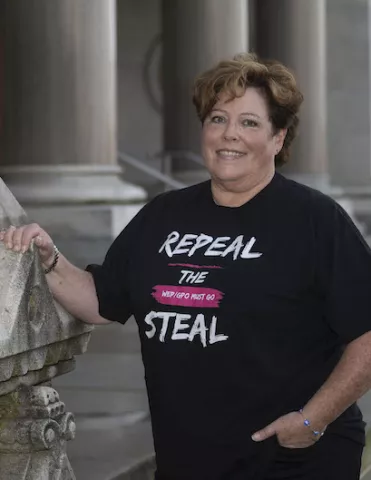
On Tuesday, the U.S. House of Representatives voted to repeal two provisions of the Social Security law that take a devastating toll on the retirement security of some public employees, including educators. The move comes after decades of advocacy on the part of NEA and NEA-Retired to explain to lawmakers how the Government Pension Offset (GPO) and Windfall Elimination Provision (WEP) hurt teachers.
The House passage of the Social Security Fairness Act comes as welcome news to educators who know of the provisions and the damage they can inflict—like former K-8 technology teacher Susan Strader.
When Strader retired in June 2024, she knew that her financial situation wasn’t as secure as she deserved after 36 years in the workforce.

She says she has zero regrets about her life choices. She spent twelve years working full-time in corporate America and another 12 years raising children. While working as a consultant, she earned a master’s degree and teaching certification, and then spent a rewarding 13 years as a teacher in Preston Public Schools in Preston, Conn.
But because she was a public employee in Connecticut, Strader is subject to GPO and WEP, which degrade the retirement security of public employees, including teachers, faculty, firefighters, and police officers in 15 states.
“When people ask me, ‘If you knew earlier that your retirement would be affected like this, would you make different choices?’ I can honestly answer no,” Strader says. “But it is still devastating to see how serving as a public employee negatively affected my finances in retirement.”
Some educators do not know they will be affected by GPO and/or WEP until they are at the tail end of their careers.
NEA-Retired President Anita Gibson has heard many heartbreaking stories from members who were blindsided to learn that benefits they earned outside of their public service would be decimated by GPO and WEP.
“Many retiring educators thought they had planned and saved and done the right things to have retirement security, only to have to keep working into their 70s or move in with family, when they can’t afford to stay in their homes,” says NEA-Retired president Anita Gibson.
“That’s why we have been relentless on this issue,” says Gibson, noting that NEA and NEA-Retired members have lobbied federal lawmakers on the issue since the 1990s. Over those years, members have traveled to Washington, D.C., or met with their representatives back home, made calls, sent emails and postcards, and explained the issue to colleagues and friends.
What Are GPO and WEP?
For far too long, few elected leaders were well-informed about how these unfair provisions hurt millions of public employees across the nation. Fortunately, educators stepped in to explain the facts:
- In 15 states, educators and other public employees—including police officers, postal workers, and firefighters, pay into their state pension system—but they do not pay into Social Security.
- WEP assumes that none of these public employees have earned Social Security benefits—which fails to take into account that many educators hold second jobs and summer gigs that absolutely do require them to pay Social Security taxes. And it clearly hurts career-changers like Susan Strader, who do not receive the full benefit of the years they did pay into Social Security.
- Then there’s GPO, which reduces spousal or survivor benefits when a family member who paid into Social Security dies. More than 70 percent of those affected by GPO lose their entire spousal benefit.
Some widowed educators might receive that survivor’s benefit while they are still working. But the minute they retire and start to receive their pension, they will no longer receive the benefit that their loved one earned.
Other factors can make the situation even more dire. Susan Strader, for example, earned just 16.9 percent of a full pension, which takes more than 35 years in Connecticut.
There are retirees living in all 50 states affected by these provisions.
Bringing home a win
The most effective way to help lawmakers understand the problems with GPO and WEP has been to share stories like Susan’s.
“Without question, the work that our members have done on this issue and the willingness of NEA-Retired members to share their stories have gotten us to where we are in this effort,” says Marc Egan, NEA’s Director of Government Relations.
The action in the House was led by Reps. Abigail Spanberger and Garret Graves, who introduced the Social Security Fairness Act in January 2023. After garnering 330 co-sponsors, they were also able to get far more than the necessary number of colleagues to sign onto a petition to force the bill out of committee for a floor vote.
Now, the bill heads to the Senate.
“I am confident we’re going to get this done,” says NEA-Retired President Anita Gibson. “Our years of advocacy will finally fix this, not only for our current retirees, but for future generations of educators,” she says. “We have created a brighter future for the profession.”





